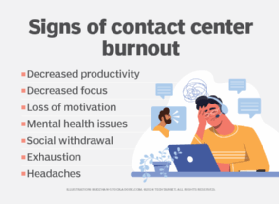contact center burnout
What is contact center burnout?
Contact center burnout refers to physical, emotional and mental exhaustion experienced by contact center employees. Since 2019, the World Health Organization has recognized burnout as an occupational phenomenon. Individuals in stressful work environments or with unmanaged chronic stress are most susceptible to burnout.

A contact center is a centralized department where agents handle all customer interactions through various channels -- including incoming calls, email, live chat and social media. Contact center agents answer queries, process payments and refunds, resolve shipping-related issues and offer technical support.
Contact centers provide many avenues for customers to interact with a company. However, it's the contact agents -- those people tackling a high number of requests while providing both varied and exceptional customer service -- who are especially susceptible to burnout.
Who is affected by contact center burnout?
While employees are directly affected by burnout, it also damages stakeholders in several ways. Those affected include the following:
- Contact center agents. Agents experience emotional and physical exhaustion, mental health decline, negative attitudes toward their work and decreased motivation.
- Companies. High employee turnover within contact center departments negatively affects a company's finances and operations. Poor customer service due to employee burnout negatively affects a company's reputation.
- Customers. Customers who interact with an affected agent are likely to receive substandard service marked by apathy, resulting in longer wait times and unresolved issues.
6 causes of contact center burnout
Chronic workplace stress is the primary cause of burnout among contact center employees. However, these specific factors also contribute to the condition:
- Work-life imbalance. An individual's career should not inhibit their ability to enjoy a personal life. Work-life balance refers to the comfortable coexistence of an employee's priorities for their continued employment with their private lifestyle. Work seeping into personal time contributes to burnout. Likewise, jobs requiring work outside regular business hours can lead to poor work-life balance.
- Monotonous tasks. Contact centers require many repetitive tasks, including updating customer databases as well as processing orders and payments. Agents also field repetitive questions posed by customers. Repetition leads to boredom and decreased employee motivation.
- Lack of autonomy. Some contact centers follow rigid protocols or require agents to follow a script. Strict policies and micromanagement limit employee creativity and autonomy.
- Emotional stress and empathy fatigue. Empathy fatigue is a secondary stress disorder that occurs when a contact center agent is frequently asked to take on the emotions and distress of others. This leaves that individual drained, emotionally detached, or numb to the distress or suffering of others. Empathy fatigue also causes anxiety, irritability and cynicism in those experiencing it.
- Interactions with difficult customers. Agents are the main point of contact for frustrated customers, who sometimes make unreasonable demands or repetitive requests. Worse, some irate customers engage in verbal abuse or name-calling.
- Lack of support and growth opportunities. Employees without clear goals who use outdated tools and technology feel intense frustration, a marker for burnout. Lack of recognition and growth opportunities further stifles motivation and contributes to burnout among contact center agents.
Signs of contact center burnout
It's important for contact center employees and managers to recognize the signs of burnout. There are several common signs, including the following:
- Decreased focus. Burnout limits concentration, resulting in an increase in errors and even difficulty in decision-making during routine tasks.
- Decreased productivity. Besides working less efficiently, employees experiencing burnout are more likely to call out sick or miss work.
- Exhaustion. Besides physical exhaustion and fatigue, chronic workplace stress causes muscle tension, back pain and suppressed immune response, leading to more frequent colds and illness.
- Loss of motivation. Burnout drains motivation and enjoyment from an agent's work.
- Mental health issues. Burnout contributes to various mental health issues, including anxiety, depression and mental exhaustion. Empathy fatigue, common among employees experiencing burnout, often precedes detachment and leads to negative customer interactions.
Learn the components of a workplace mental health strategy. - Physical symptoms. Headaches, insomnia and loss of appetite are common physical symptoms associated with burnout.
- Social withdrawal. Employees experiencing burnout often distance themselves from colleagues and sometimes develop cynicism or negative attitudes toward their work and associates. More serious burnout can lead employees to experience mood swings and changes in personality.
How to mitigate contact center burnout
Understanding the causes and signs of burnout is essential in creating and maintaining a healthy work environment. While contact center agents experiencing burnout should seek immediate treatment, employers can do the following to mitigate the risk of burnout in the first place:
- Create a positive company culture. A work environment that prioritizes open communication and provides a channel for feedback is essential for a positive workplace culture. Open communication boosts camaraderie and positively affects relationships between colleagues.
- Prioritize mental health. Provide accessible mental health resources for employees. Offer stress-reduction programs that teach coping skills and stress management. Encourage time off for employees to recharge, and offer breaks throughout the workday. Offer wellness programs and benefits to encourage employees to prioritize their mental and physical health.
- Address difficult customer interactions. Provide de-escalation training for contact center agents. Establish policies to protect agents from abusive customers and enable agents to redirect difficult customers to supervisors, if needed.
- Provide adequate support to agents. Offer continued advancement and training opportunities for employees. Provide easily accessible and open channels of communication between agents and supervisors. Hold regular team and individual meetings to set clear expectations for employees. Ensure adequate, up-to-date tools and technology are available to agents.
- Recognize and reward employees. Acknowledge exceptional efforts during companywide meetings, in a company newsletter or during one-on-one meetings. Offer a peer recognition program or points-based system that lets colleagues recognize each other's accomplishments, fostering camaraderie. Share positive customer feedback with agents to highlight exceptional customer service.
- Optimize efficiency. Streamline workflow and operations to improve efficiency. Use automation to handle repetitive tasks and AI technology to reduce agents' workloads. Use scheduling management tools to avoid overworking agents.
- Create an optimal work environment. A comfortable workspace is a solid base for focused and productive output. When possible, offer hybrid work, remote work or flexible scheduling. Provide access to food and beverages, clean restrooms, and comfortable break areas for on-site employees.
Learn more about how to improve contact center agent performance.







